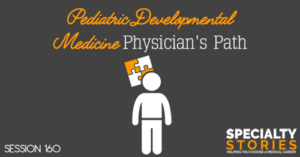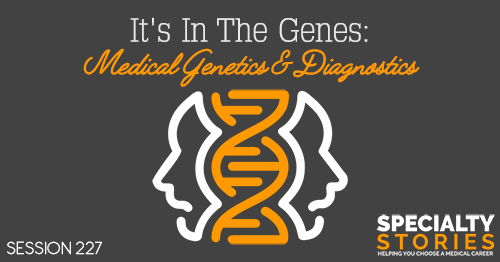Apple Podcasts | Google Podcasts
Session 160
Dr. Joel Shulkin talks about his path through the HPSP (Health Professions Scholarship Program) that landed him in Pediatric Developmental Medicine and why Developmental Medicine is a part of Pediatric Medicine.
Joel is a developmental-behavioral pediatrician and author of Adverse Effects which falls under the medical suspense genre.
For more podcast resources to help you along your journey to medical school and beyond, check out Meded Media. Check out eShadowing.com that just started this week. It happens every Monday at 8pm, Eastern. We are going live with a physician to talk about their specialty. We’re going to do some case studies and a lot of Q&A. The platform is able to hold 5,000 students.
Listen to this podcast episode with the player above, or keep reading for the highlights and takeaway points.
[01:19] Interest in Developmental Behavioral Pediatrics
Joel was in the Air Force, and had gone to the HPSP program or the Health Professions Scholarship Program, which actually started in his second year of medical school. When it came time for clerkships, they needed to do two rotations at military hospitals.
He really wanted to get into cardiology and dermatology, which were the most popular ones. But they weren’t available in the different states that he called. Finally, he called Wilford Hall in Texas and asked if they had available pediatric rotations and the only rotation available was developmental medicine. They explained what it was, that he had to deal with developmental disorders ADHD, autism, and learning disabilities. And if he’d do the rotation, he would be spending a week at this camp for kids with disabilities and special needs facilitated by Dr. Charles Morton.
Joel ended up matching at Wilson Hall and Dor. Morton became his mentor for which he did extra time with.
When it came time to do his assignment to pay back the military, there was a time that they were looking at sending people off to far rotations. There was an opportunity that he could work in a developmental clinic in Germany. So he spent three years out there getting real-world experience in basic community health settings.
As the only local developmental specialist, even though he hadn’t even done fellowship, he read everything he could find on autism and ADHD to learn more and more.
And when he had to end his time with the military, he realized he wanted to do a fellowship in developmental pediatrics.
[04:55] Why a Specialized Field Inside of Pediatrics
Psychiatry really focuses on mental health issues. And a lot of times, they’re really looking more at older kids for depression and anxiety. There are psychiatrists who understand autism. They manage ADHD. They tend not to do as much with the learning disabilities because they’re really focused on the medication side.
There are exceptions though Stanley Greenspan, creator of the DIR Floortime Model for treating autism. He was a child psychiatrist who really understood the developmental aspects of the disorder. But most don’t spend that much time. In fact, most psychiatrists don’t actually do rotations, or more than the limited rotation in pediatrics.
Psychologists come from a non-MD standpoint. They’re doing well on the diagnosis and sometimes on the treatment, but not so much on the overall medical piece. Neurologists focus more on the neurologic side and the physical things they can quantify.
In developmental pediatrics, it started as developed pediatrics and then it branched off. Boston Children’s Hospital led the field of going more toward developmental-behavioral. The focus on the early intervention on the behavioral aspects of different developmental disorders and looking at the developmental trajectories. Whereas neurodevelopmental medicine was led by Johns Hopkins in Baltimore which focuses more on the neurologic side.
Joel was really interested in the early intervention side and looking at children as a whole entity.
“We look at the fact that if you have a child with autism, or ADHD, there are other medical pieces that play into that.”Click To TweetNot only can autism and ADHD affect their eating, sleeping, and health behaviors. But if you have a medical condition, that’s going to affect your sleep, which can affect your focus and attention. And if you have a child who is autistic and who has sensory issues, that can affect their behavior and their development as well.
So on the pediatric standpoint, they’re really looking at that whole aspect. They’re not just looking at the diagnosis and the mental health side, or the neurologic side, but they’re looking at all those general pediatric issues. Although he’s not taking the role of the primary care physicians, sometimes they pick up on things that the primary care doctors miss.
[09:47] Traits to Become a Good Developmental Behavioral Pediatrician
You have to be a little bit of a detective and you have to like mystery. Because if you’re diagnosing autism, you can’t just do an X-ray or an MRI. That’s not going to give answers.
Instead, you have to do a lot of interviewing and asking questions. You have to do a general physical exam to rule out things. It doesn’t get attractive as you have to rule out the impossible before you can get to the inevitable. You have to really differentiate and do a lot of differential diagnosis and teasing out.
“You have to be patient because the kids don't always do what you want them to do. And they don't always give you those clues that you want right away.”Click To TweetSometimes, you have to be even more patient to parents. And so if you’re not somebody who likes talking to people, this isn’t really the field for you. Because most of what they do is gathering information and counseling parents. They point them in the right direction and explain to them about helping to understand their child.
With developmental disorders, 90% of it is to tell parents that 50% of treating a child with autism or any kind of disorder is trying to teach the child the skills they need and trying to find what they need. The other 50% is helping everybody else to understand them. And often, that’s the harder 50%. These are two aspects that are really important for anybody going into this field.
Time management is a big one as well because their reports are not short. His average report for a new patient is probably somewhere between three to five pages. They summarize all the information that parents bring in as well as everything they report and what they’ve observed. They figure out any testing they might do.
Curiosity is just as important too and the desire to keep learning. Joel has done outside training in ways that they treat autism so that he can understand it better and be able to better counsel parents.
[14:06] How Diagnosis Works and Laying Out Treatment Plans
In Florida, they have psychologists who do the formal testing. Medicaid does not pay for any developmental testing, or even psychological testing. And so they have a process where they have psychology fellows who can do some testing. As a result, their psychologists do most of the actual testing as well.
Sometimes, a fair number comes to Joel for a diagnosis. If it’s not straightforward, he would have to gather enough information so he feels comfortable giving the diagnosis.
Even before they found out that Medicaid wasn’t paying for testing, he was doing a lot of testing himself as well as the interpretation and the feedback to the parents. At least, that way, he understands and he can really evaluate the testing that has been done to be able to counsel parents well.
He also gets a number of families who already have a diagnosis as well – whether it’s from our psychologist or someone in an apartment or from somewhere else. And they’re either just establishing care for monitoring, or trying to get help.
Once he sees the patient, he continues to follow them. If they’re under three, he sees them every six months or even more frequent if they’re less than 18 months, because there’s so much that can change developmentally.
“At that young age, especially if the diagnosis is unclear, or if they're starting new therapies, and especially intensive therapies, a lot can change.”Click To TweetFor older kids, he usually sees them every one to two years, depending on how old they are. And he sees them at 18, or when they graduate high school, whichever comes last. Because there are kids with disabilities who stay in high school until they’re 23 or 25. That being said, not all developmental pediatricians do that. Some cut off earlier and they may only see kids up to age six. So it depends on your practice.
[16:47] Typical Day
Joel sees one to two new patients a day and then the rest of follow-up. They spend so much time on counseling and he’s getting information. He’s allowed 90 minutes for a new patient, and 30 to 60 minutes for a follow-up. And if it’s been six months and more, he’d usually do a 60-minute follow up because there are so many issues that come at that time. If it’s a really stable patient coming in for a medication check, he might do a 30-minute follow-up.
“This field is about quality, not quantity.”Click To TweetIt’s not typical for him to see 30 or 40 patients a day. Joel has been fortunate that the hospital that he works for has come to appreciate and understand that this field is about quality, not quantity.
[18:05] Taking Calls
He has only taken calls five times in the six years that he has been there. And the call he got was just a question that came up. He doesn’t get called into the emergency room or inpatient. He doesn’t even really do inpatient consultations. And the two times that he has gotten called, they weren’t appropriate. They wanted him to evaluate for autism, the child was impatient, and there was no parent available. So it makes for a good life outside of working.
“Developmental pediatricians get paid less than most other specialties. But the trade off of that is the quality of life.”Click To Tweet[19:39] Training Path
If you’re doing Air Force, you’d have that extra time but most medical schools do their three-year pediatric residency and then you have a three-year fellowship. Many go into fellowship right after residency.
Some would go into practice first and then they go back and do fellowship later. The good side is that you get to understand what a community setting is like. And you get to see and make sure this is what you really want. But then again, you get used to a certain amount, your paycheck, and then suddenly, that’s getting cut off as you go back to fellowship. It’s mostly outpatient type training. And every program is a little different. They have some kind of a call. There are some programs that do inpatient calls.
Nationally, if you’re doing the neurodevelopmental disabilities, then you’re actually doing two years of neurology. So you’re actually taking adult neurology calls and doing all of the other aspects.
But for developmental behavioral pediatrics, they would only work in an Urgent Care Clinic, three or four hours a week, or once or twice a month. The programs have also changed a little bit.
Now, many of them have this leadership program where they may do a year of that. They’re doing leadership courses, and even a leadership project. They didn’t really have that when he was a fellow. Joel went to Boston Children’s Hospital and then to Harvard for his Master’s of Public Health.
During fellowship, though he spent two years taking classes at Harvard, at the same time, he was seeing patients. So that was carved out in his schedule, as well as the outpatient clinic. They had lectures from a psychiatrist and from a neurologist that really helped give them the foundation to build on. They also had to do a research project.
[23:56] Message to Future Pediatricians
There is a lot of confusion out on the internet because he’s listed as a psychiatrist. But the main thing to recognize is that when you’re referring to him, be sure to ask.
In fact, if they sent a referral with no question to some specialists, they would send it back and they won’t see them until they tell them what they want. That being said, Joel gets referrals all the time for development or speech delay.
“Having a good question really helps.”Click To TweetSo first, you need to understand what they do. Recognize that these specialists are trying to differentiate between different developmental disorders and counseling parents on what they can do to help promote their child’s development. They also manage medications, but that’s a very small part of his practice. Joel focuses more on the therapies and the interventions that these children need, and watching them develop over time to help counsel parents along the way as new challenges arise.
[26:38] What He Wished He Knew Going Into Developmental Behavioral Pediatrics
Even if Joel knew the paycheck, he still would have gone into it. His perspective on autism has changed a lot. When he first started out, he saw it as kind of this ambiguous disorder. He really only knew about the kids with severe types. And now, he has come to appreciate autism more as a neurodiversity.
“Autism really is just a different way of thinking, a way of brain functioning, it’s just a different type of personality more than anything.”Click To TweetJoel also emphasizes that early intervention is so key. There’s no medicine that treats it. And that is something that he really would love for primary care physicians to understand.
The one complaint that he gets from parents more than any other complaint about their pediatrician or their family practice doctor is that they weren’t listening to them. That they had concerns and they kept being told, “Let’s wait and see.”
The worst thing they can do with child development is wait because there’s so much that changes. But the first five years are critical. After five years, the rate of brain development drops dramatically. And so they really want to try to intervene as early as possible.
Joel’s wait time is currently six months, which isn’t bad compared to some other parts of the country. He would much rather that the child come to him, having waited six months and saying they got all these therapies in the meantime but they’re seeing less progress, than having waited six months to see you and things have gotten worse.
[30:01] The Most and Least Liked Things
The lifestyle is definitely good for Joel, especially, having time for his family, and for his writing. But also, he really likes teaching. And so it’s a good opportunity to incorporate that teaching aspect into his practice.
He loves spending half an hour of teaching the parents about their child and how they can help their child. It’s not something you find in other specialties.
On the flip side, the hardest part is when kids who lack the resources can be waiting two to three years just to get therapy. Or if they have a parent who just doesn’t have the ability to advocate for the child.
In terms of moving to other states where the healthcare system is better, hence better patient care, Joel always had to factor in his family. And he has actually lived in multiple places. He lived in South Carolina before he moved to Florida, and the resources weren’t much better.
You could move to somewhere where you’re supposed to have great resources, but you still may not be able to get things going as well as you think you will. So Joel has instead looked at this as an opportunity for him to direct patients.
[33:36] Major Changes Coming to the Field
Joel admits he doesn’t see anything groundbreaking in the near future. There has been good evidence showing that it may not be what you’re using, how you’re using, and how early you’re using it that makes the difference. Even the Duke study that finally got released showed no significant changes with that in treating autism.
“There is no cure for autism.”Click To TweetAgain, there is no cure for autism. So if we think of it as neurodiversity, they really shouldn’t necessarily be looking for a cure. Instead, they should be looking at how they can help these kids be successful and happy.
[36:29] About His Book, Adverse Effects
Joel recently published a book, Adverse Effects. It’s about a psychiatrist in Boston who specializes in memory. And she is testing an experimental memory drug on her patients who have amnesia, or at least partial or global amnesia.
But two of her patients become psychotic. One kills himself, and the other ends up killing others and themselves. And she becomes very driven to find out what’s going on because she’s also taking the same drug for her amnesia.
Adverse Effects is Book 1 of Joel’s Memory Thieves series.
[38:35] Final Words of Wisdom
When you’re doing your rotations, especially doing a pediatric rotation, try to see if you can go to a developmental clinic, and see what it’s like. See if you can talk with other development physicians and see if you get the same kind of enthusiasm. If you’re somebody who is looking for that kind of field where you’re going to look forward to each day going into work, this may be the right field for you. And the best way to find out is to sit in and see what it’s like.
Links:
SEARCH SITE
LISTEN FOR FREE












